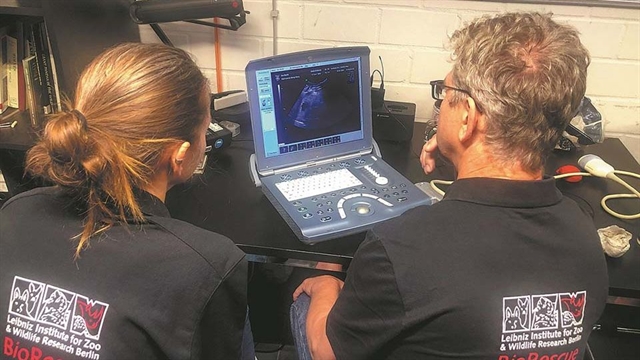Meng Meng was artificially inseminated in March. According to the zoo, female giant pandas are only fertile for approximately 72 hours each year.

Staff conduct an ultrasound scan for Meng Meng, an 11-year-old female giant panda at Berlin Zoo, in Germany on August 11, 2024. The zoo said on Tuesday that Meng Meng has been confirmed pregnant with twins after ultrasound scans detected two heartbeats. Photo XINHUA/VNA
BRUSSELS The Berlin Zoo has announced that its 11-year-old female giant panda Meng Meng is pregnant again with twins and, if everything goes well, could give birth by the end of the month.
The announcement was made after zoo authorities conducted an ultrasound examination that showed the developing fetuses. Giant panda experts from China arrived in Berlin to assist with preparations for the ultrasound.
Meng Meng was artificially inseminated in March. According to the zoo, female giant pandas are only fertile for approximately 72 hours each year.
“One heartbeat could initially be made out on the ultrasound equipment, and shortly thereafter a second as well,” the zoo announcement said, adding that the fetuses are now 2.5 centimetres long, but will grow significantly by the end of the month.
Gestation generally takes three to six months, but the zoo said that dormancy – a period of up to several months in giant pandas during which an egg remains suspended in the mother’s uterus and does not continue to develop – was the reason for the delay in confirming Meng Meng’s pregnancy.
Zoo veterinarian Franziska Sutter told the media that the pregnancy was still at a risky phase.
“Amid all the enthusiasm, we have to realise that this is a very early stage of the pregnancy and that a so-called resorption, or death, of the embryo is still possible at this stage,” she said.
If everything goes smoothly, the cubs will be the first in five years to be born at the Berlin Zoo after Meng Meng gave birth to twin cubs, Pit and Paule, in August 2019. They were the first giant pandas born in Germany and became stars at the zoo.
Both Pit and Paule, whose Chinese names are Meng Xiang and Meng Yuan, returned to China in December to join the breeding programme under an agreement with the Chinese government.
Their parents, Meng Meng and Jiao Qing, arrived at the Berlin Zoo in 2017.
In early July, Ouwehands Dierenpark, a zoo in the Netherlands, announced that its giant panda Wu Wen gave birth to a cub. A second cub that was born about an hour later died shortly after birth.
The surviving cub is the second born at the Dutch zoo after Fan Xing was born in 2020. Fan Xing, a female, returned to China in September last year to join the breeding programme.
In Spain, the Madrid Zoo Aquarium formally introduced a new pair of giant pandas, Jin Xi and Zhu Yu, in May in a ceremony attended by Queen Sofia, who has been a giant panda advocate since the 1970s.
The arrival came after panda couple Bing Xing and Hua Zui Ba, accompanied by their three Madridborn cubs Chulina, You You and Jiu Jiu, returned to China on February 29.
In Austria, the Schonbrunn Zoo in Vienna is expecting the arrival of a pair of giant pandas from China under a 10-year cooperation agreement on giant panda conservation that was signed in June.
The giant pandas Yuan Yuan and Yang Yang, who are now in Vienna, will return to China after the expiration of an agreement this year.
The two sides have applauded their successful cooperation in giant panda breeding, scientific research, technical exchanges, personnel training and public education.
Yang Yang, a female, and Long Hui, a male, have had four litters in Vienna totaling five cubs through natural mating, which is a European record.
On August 8, giant panda twins Bao Di and Bao Mei in Belgium’s Pairi Daiza zoo celebrated their fifth birthday in a ceremony attended by new Chinese Ambassador to Belgium Fei Shengchao.
The twins and their elder brother Tian Bao, born in 2016, will leave for China this autumn to join the breeding program. THE CHINA DAILY/ANN